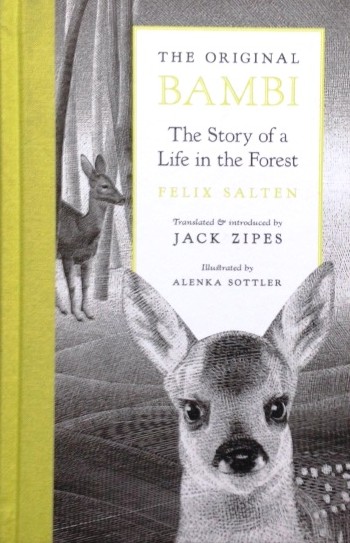Inspiring Young Readers
 posted on 28 Apr 2022
posted on 28 Apr 2022
The Original Bambi: The story of a Life in the Forest by Felix Salten, translated by Jack Zipes
I would imagine that most people believe that Walt Disney’s tear-jerker, Bambi is a creation of the film company when it was released in 1942 but this new translation of the original 1922 novel by Feiix Salten aims to put the record straight.
This new translation and the accompanying introduction come from Jack Zipes, one of the pre-eminent academics writing about children’s literature, folklore and fairy tales today. His mission is to claim back the guts of Salten’s original story that he believes Disney eviscerated for cheap, sentimental effect.
The informative introduction gives us a potted biography of Salten and his rather contradictory ideas. Always a social outsider who desperately wanted to be an insider, a man who wanted social prestige but would never be allowed on the inside of the establishment, he was also a Jew – something that would guarantee his outsider status in Europe in the first half of the 20th century.
Salten found his metier in the writing of animal stories and his love of nature and the animal kingdom was something he felt strongly. But even here there were contradictions because Salten was an animal lover who enjoyed hunting them – hunting in his mind being a statement about humanity’s position in the natural order of things. A philosophy that may seem strange to us but led Salten to seeing the animal world and our position in it as an allegorical way of describing the inequalities and tragedies of human life ( and presumably, by extension, his own miserable existence).
And so the anthropomorphic animals that populate the story of Bambi allow Salten to explore some very dark places. Zipes expresses this clearly and effectively in his introduction:
“…Disney and his collaborators did far more than add cuteness: they transformed the novel into a syrupy love-fest that justifies male domination and power…….This is a great shame, for Salten’s novel is a brilliant and profound story of how minority groups throughout the world have been brutally treated, even when they try to live peacefully in their own environment.”
The story of Bambi that Salten tells includes the death of Bambi’s mother at the hands of hunters but isn’t by any means the emotional centre-point that Disney latched on to. We follow Bambi from helpless fawn, constantly in dialogue with the other animals of the forest, to a brave young stag who falls in love and eventually to a great mature stag who knows, with the help of a noble mentor, how to survive.
Always in the background is the threat of Him – the creature who can bring death and destruction that no-one can stand against. The hunter, of course. And the figure of the hunter – Him – becomes almost mythological amongst Bambi and his extended family: a god or a devil – perhaps both.
There’s no doubt that Salten’s view of nature is that it is red in tooth and claw and could potentially be nasty, brutish and short. But what’s also clear is that this is what it means to live a ‘natural’ life and if we are to find balance and harmony in life and death, we must come to a sensible accommodation with the natural world.
The new translation of Bambi certainly isn’t a simple, sentimental children’s book but it does share much in common with the wildlife stories of Jack London such as Call of the Wild or White Fang. None of these preclude a younger readership but equally there will be plenty of adults who will find richness in this the story.
And there’s a bonus – some glorious illustrations. As the book’s own blurb puts it:
“With captivating drawings by award-winning artist Alenka Sottler, The Original Bambi captures the emotional impact and rich meanings of a celebrated story.”
Available to order from your local independent bookstore at the cost of £20 or go directly to the Princeton University Press website to get your copy.
Terry Potter
April 2022

